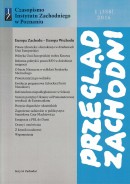Z dziejów niemieckiej antynazistowskiej reprezentacji politycznej na wychodźstwie. „Council for a Democratic Germany” (1944-1945)
From History of a German Anti-Nazi Political Representation in Exile. ‘‘Council for a Democratic Germany’’ (1944-1945)
Author(s): Katarzyna Jedynakiewicz-MrózSubject(s): Politics / Political Sciences
Published by: Instytut Zachodni im. Zygmunta Wojciechowskiego
Summary/Abstract: The article presents the genesis, pursued goals and activity of the Council for a Democratic Germany – an organ aspiring to the role of a representative of the German anti-Nazi groups in exile. The Council, created in May 1844 in the USA, was intended as an alternative to the Nationalkomitee Freies Deutschland founded in July 1943 in the Soviet Union. The chairman of the Council was Paul Tillich, well-known from the broadcasts in German of the Voice of America radio station. The political basis of the Council was formed by German left-wing parties (the Neu Beginnen group, SAP, part of the SPD, KPD) and the Chrystian-Democrats (Zentrum). Apart from the Declaration of May 3, 1944, its members developed a detailed programme of the reconstruction of the Reich after Hitler’s downfall. The Council’s proposals concerned the role of trade unions, the socio-economic system, changes in education and the judiciary. The factor that held those conceptions together was the postulate of entrusting the transformation of Germany’s political system to Germans themselves and not to the representatives of the victorious coalition. The Council’s aspirations to participate in the process of the reconstruction of Germany were not fulfilled. This was because of some controversial opinions of its members – opposition against the Allies’ occupation of Germany, lack of acceptance for shift of the border, undermining the responsibility of the German nation for the crimes of the Hitler regime. The main reason, however, of a failure of this initiative was a lack of support from the ruling authorities of the United States. Having no confidence in the attitude of the inhabitants of the Reich, the White House gave its support to the conception of a long-term control of Germany by the victorious Powers. The decisions of the conference of the Big Three in Potsdam put an ultimate end to the hopes of the refugees. The Council was dissolved in October 1945.
Journal: Przegląd Zachodni
- Issue Year: 325/2008
- Issue No: 02
- Page Range: 109-141
- Page Count: 33
- Language: Polish

